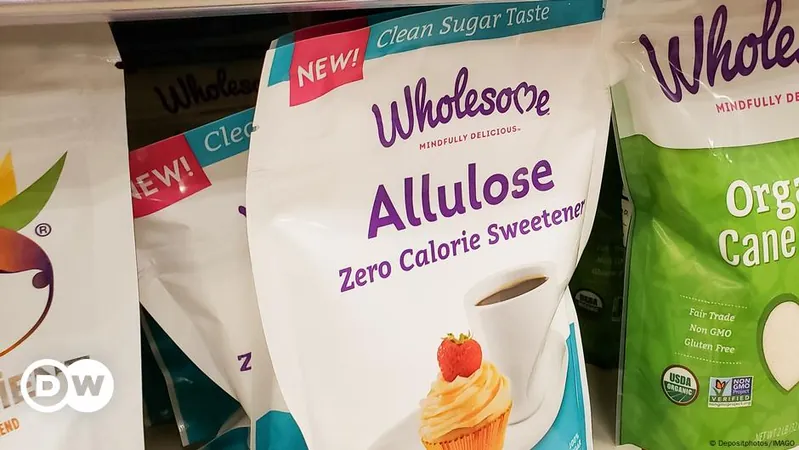
Can Allulose be Your Sweet Escape? The Surprising Benefits of This Natural Sweetener!
2024-12-23
Author: Chun
Allulose, a rare form of sugar first discovered in wheat leaves during the 1940s, has recently been garnering attention in the world of health and nutrition. Despite its historical obscurity, this unique sweetener has been thrust into the spotlight thanks to groundbreaking research conducted in the 1990s by Ken Izumori at Kagawa University in Japan. Izumori identified a soil microorganism capable of converting fructose into allulose, paving the way for more sophisticated studies over the ensuing decades.
Today, allulose, also known as D-allulose or D-psicose, is being embraced as a sugar alternative, particularly in countries like the US and South Korea, where it has received regulatory approval for commercial use. Found naturally in small quantities in foods such as figs, raisins, kiwis, wheat, maple syrup, and molasses, allulose is about 70% as sweet as traditional sugar but contains only 10% of the calories. This almost calorie-free attribute has made it a popular choice for those focusing on weight management, and it’s being hailed as a potential boon for individuals with type 2 diabetes.
But what’s the science behind these claims?
The FDA has classified allulose as a “generally recognized as safe” sweetener in the US. In stark contrast, other regions, including the European Union and Canada, are still evaluating allulose's safety as a novel food. Current research confirms that while the body absorbs allulose, it does not metabolize it. This means that most of the calories in allulose are excreted rather than utilized, essentially tricking the body into thinking it’s consuming fewer calories.
Notably, allulose has been shown to be non-cariogenic, meaning it doesn’t contribute to tooth decay like regular sugar does. This makes it a favorable option for sweetening treats without increasing dental risks.
The Glycemic Index: Allulose vs. Sugar
One of the most impressive attributes of allulose is its impact on blood sugar levels. The glycemic index (GI) measures how quickly foods elevate blood glucose levels, with pure sugar scoring a significant 65. In comparison, allulose appears to have little to no effect on blood glucose levels, making it a safer choice for those monitoring their sugar intake.
Individuals at risk of type 2 diabetes may find allulose particularly beneficial. Studies indicate that high doses of allulose do not cause significant fluctuations in blood glucose or insulin levels, which is a promising finding for those with impaired insulin sensitivity.
The Allure of “Natural” vs. “Healthy”
Though marketed as a natural sweetener, the term "natural" can sometimes be misleading. While companies like GOALZ are enthusiastic about using allulose to reduce calories in their products—up to a staggering 40% in certain chocolates—consumers should be mindful that "natural" does not always equate to "healthy." Excessive consumption of allulose can lead to gastrointestinal discomfort, including symptoms like stomachaches, bloating, and diarrhea.
Importantly, it's essential to recognize that while allulose may be a healthier alternative to sugar, more extensive research is needed to fully understand its long-term health implications.
What’s Next for Allulose?
As allulose continues to gain traction, it raises critical questions about what it means to consume sweeteners—natural or otherwise. While it offers exciting possibilities for those seeking sugar alternatives, moderating intake remains crucial. More research, especially larger clinical trials, is necessary to validate the myriad benefits being claimed.
In the quest for healthier living, allulose could be the sweet escape many are looking for—just be sure to tread lightly!
Stay tuned as more findings about this intriguing sweetener emerge!



 Brasil (PT)
Brasil (PT)
 Canada (EN)
Canada (EN)
 Chile (ES)
Chile (ES)
 España (ES)
España (ES)
 France (FR)
France (FR)
 Hong Kong (EN)
Hong Kong (EN)
 Italia (IT)
Italia (IT)
 日本 (JA)
日本 (JA)
 Magyarország (HU)
Magyarország (HU)
 Norge (NO)
Norge (NO)
 Polska (PL)
Polska (PL)
 Schweiz (DE)
Schweiz (DE)
 Singapore (EN)
Singapore (EN)
 Sverige (SV)
Sverige (SV)
 Suomi (FI)
Suomi (FI)
 Türkiye (TR)
Türkiye (TR)